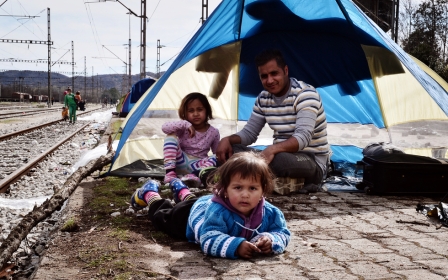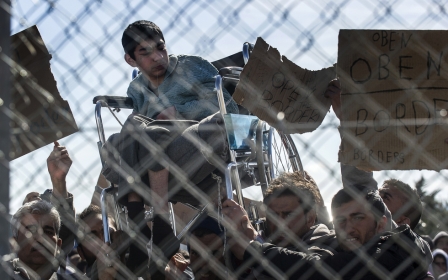Turkey's bid for visa-free travel for its citizens to Europe could backfire

Turkey’s Prime Minister Ahmet Davutoglu proudly told reporters of a "Kayseri-style bargaining" which he and his colleagues were engaged in at the EU-Turkey summit meeting on Monday this week. The inhabitants of Kayseri, a large thriving industrial city in central Turkey, have long been a byword for business cunning and acumen.
Was Turkey showing foresight when it abruptly upped its demands this week, doubling its request for EU aid from $3 billion to $6 billion, and insisting that Turkish citizens get the right to travel without visas in the Schengen area four months ahead of the previously agreed date set for October-November this year?
Perhaps. It certainly took the EU by surprise. “The EU was not expecting our move,” the prime minister declared. Some European governments are indeed already critical of the agreement because it came hot on the heels of news that the government had seized Zaman, one of Turkey’s largest circulation dailies
On paper the Turkish government’s tough tactics have got what it wanted and Davutoglu has been able to declare a victory. The European leaders – pressed hard by the German Chancellor Angela Merkel - took 12 hours of tense discussion to reach agreement, but in the end they provisionally agreed to give Turkey what it was asking for. The agreement applies only to countries which are members of the Schengen common visa area: Turks will still require visas for the UK.
But if it turns out that Turkey overplayed its hand and demanded concessions that the EU countries will not be able to give, then the deal will look much less of a success in a few months and there is likely to be strong bad feeling on both sides.
Simmering grievance
The disappointment in Turkey would be politically explosive. Seen from Turkey, easier travel for Turks in Europe looks like something to which the country’s people are entitled, a long overdue normalisation of the Turkish-EU relationship, ensuring that Turks - citizens of a major regional economic and strategic power - have the same rights as citizens of other countries on the edge of Europe.
Ordinary people in Turkey have found it ever harder to travel easily inside the EU for the last quarter of a century. The restrictions affect business travellers, families, students, and officials, reinforcing the deep sense of psychological estrangement between Turkey and Europe and sometimes causing personal tragedies such as for example when cumbersome visa processes delay someone from seeing a dying relative.
Other non-EU European countries do not face such strong barriers. The EU announced on Wednesday that Georgians, citizens of a country whose links with the EU are much less long-standing than those of Turkey, will soon also enjoy the right to visa-free travel inside the Schengen zone. Unlike the Turks, the Georgians, possibly because they are a much smaller and predominantly Christian country, have not had to engage in tough political bargaining to obtain this privilege.
But question marks and uncertainties bristle around the visa deal struck by Davutoglu on Monday. EU governments across Europe, notably that of France, still seem to have serious reservations about easing visas in particular and a veto from any one of them could torpedo the proposal.
They will have to reckon with the fact that Turkey will work determinedly to complete its side of the agreement, almost certainly passing most of the 36 items of legislation still needed for the change by June. The prime minister has asked opposition parties to cooperate with the government in helping this and it is unlikely they will refuse.
Not all the requirements will be easy: it remains to be seen whether Ankara will also recognise the government of Cyprus, with which it has been locked in dispute since 1974. Though talks for a Cyprus settlement are going well, nobody imagines that there will be a full Cyprus peace agreement by June.
Misplaced EU suspicion
More fundamentally, Turkey’s size and persisting historical antagonism towards it among public opinion in EU countries lead many right-wing politicians to oppose fiercely the idea of free movement by Turks inside the EU.
Turkey’s population size – currently around 78 million – is one source of anxiety. Another is a strong element of cultural and historical prejudice in European public opinion: one Greek MEP even denounced Turks in the European Parliament yesterday as "dogs" and was promptly ejected from the session. But readers’ comments below newspaper articles in European countries also display feelings towards the idea of Turkish migration which are not so very different.
The hostility rests on an out-of-date view of Turkey’s society and economy. Industrialisation and economic development in Turkey over the last three decades have markedly reduced the disposition of the population in the West of the country to migrate in search of a better life. Indeed, before the refugees from the conflict in Syria began to flood the country four years ago and make an impact on the Turkish labour market, Turkey was actually the recipient of illegal migrant workers from abroad, from neighbouring countries including Bulgaria and Romania before they joined the European Union.
Opponents of allowing easier access to Europe for Turks point to more recent upheavals such as the fighting in south-eastern Anatolia between the government and Kurdish militants. The possibility that persons uprooted in the conflict might try and move to Europe cannot be excluded - but again the established pattern suggests that it is much easier for migrants from eastern Anatolia to settle in western or central Turkey and that is likely to remain their preference over exile in another country.
The biggest obstacle to visa liberalisation, however, may prove to be the blatantly confrontational spirit in which the agreement was made this week. After being rebuffed and even snubbed on many occasions in the past by the EU, it is not surprising that when it had the upper hand this week, Ankara tried to extract every single scrap of advantage from it that it could. With Germany behind it, its hand is additionally strong.
But despite Angela Merkel’s short-term tactical support, it is no secret that Germany "has major doubts" about letting Turkey into the EU. The "Kayseri bazaar spirit" may turn out not to be the right means to winning the equal rights in Europe that Turks so ardently desire.
- David Barchard has worked in Turkey as a journalist, consultant, and university teacher. He writes regularly on Turkish society, politics, and history, and is currently finishing a book on the Ottoman Empire in the 19th century.
The views expressed in this article belong to the author and do not necessarily reflect the editorial policy of Middle East Eye.
Photo: Turkish Prime Minister Ahmet Davutoglu and German Chancellor Angela Merkel gesture as they look from a balcony during their meeting in Ankara on 8 February, 2016 (AFP).
New MEE newsletter: Jerusalem Dispatch
Sign up to get the latest insights and analysis on Israel-Palestine, alongside Turkey Unpacked and other MEE newsletters
Middle East Eye delivers independent and unrivalled coverage and analysis of the Middle East, North Africa and beyond. To learn more about republishing this content and the associated fees, please fill out this form. More about MEE can be found here.





